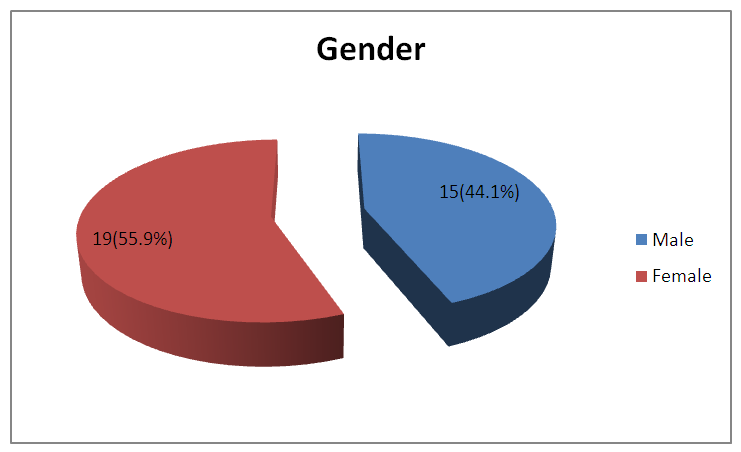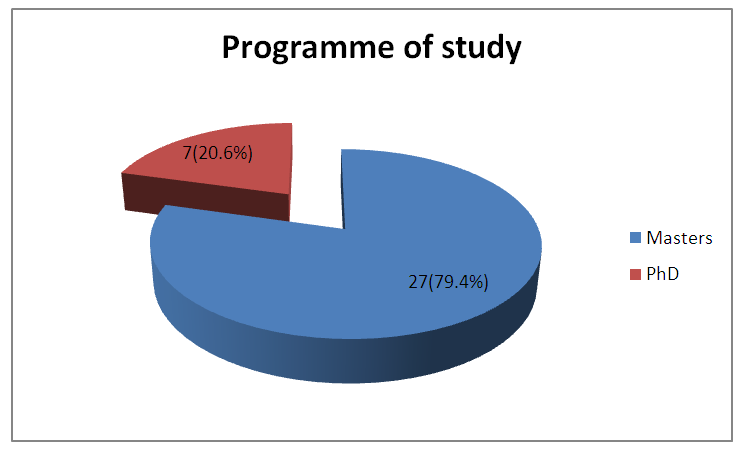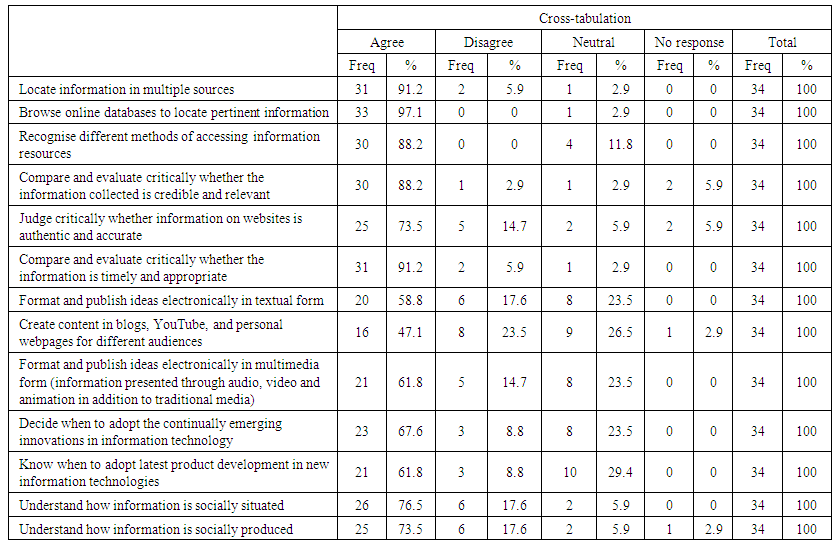-
Paper Information
- Paper Submission
-
Journal Information
- About This Journal
- Editorial Board
- Current Issue
- Archive
- Author Guidelines
- Contact Us
International Journal of Library Science
p-ISSN: 2168-488X e-ISSN: 2168-4901
2018; 7(2): 32-36
doi:10.5923/j.library.20180702.03

Information Literacy Skills among Library and Information Science Postgraduate Students of Nnamdi Azikiwe University, Awka, Nigeria
Odede Israel
Department of Library and Information Science, Delta State University, Abraka, Nigeria
Correspondence to: Odede Israel, Department of Library and Information Science, Delta State University, Abraka, Nigeria.
| Email: |  |
Copyright © 2018 The Author(s). Published by Scientific & Academic Publishing.
This work is licensed under the Creative Commons Attribution International License (CC BY).
http://creativecommons.org/licenses/by/4.0/

This study assessed information literacy skills of library and information science postgraduate students at the Nnamdi Azikiwe University, Awka. The quantitative approach was employed to solicit information from the postgraduate students. Data collected were analysed using statistical tools such as frequency count and simple percentage. A total of 34 postgraduate students admitted for the 2016/2017 academic year participated in the study. The study found that the postgraduate students are information literate as all items got more than half affirmative responses except for their ability to create content in blogs, YouTube, and personal webpages for different audiences. The study therefore, advocate the urgent need to improve postgraduate students’ publishing literacy skills to enable them possess the needed skills to format and publish research and ideas in textual and multimedia formats as well as to be able to create content in blogs, YouTube, and personal webpages for different audiences.
Keywords: Information literacy skills, Postgraduate students, Library and information science
Cite this paper: Odede Israel, Information Literacy Skills among Library and Information Science Postgraduate Students of Nnamdi Azikiwe University, Awka, Nigeria, International Journal of Library Science, Vol. 7 No. 2, 2018, pp. 32-36. doi: 10.5923/j.library.20180702.03.
1. Introduction
- The rapid development of information technology has forced students to acquire new information skills in order to effectively use the opportunities provided for them by the advancement of information and computer technologies. The radical change in provision of information through the use of Information Communication and Technology (ICT) in this age requires a lot of skills, knowledge and strategies to ensure maximum utilization of information [17]. In order for postgraduate students to effectively and efficiently utilize information in this era of information technology advancement, they are required to possess information literacy skills. Information literacy is rooted in the concept of library instructions and bibliographic instructions.The concept of “information literacy” was first introduced in the United States by Paul Zurkowski in the early 1970’s. Information literacy involves an understanding and knowledge of the structure and sources of information. It is the ability to access and retrieve quality information independently and reflectively in order to build on a personal knowledge base. Computer and information skills are seen as essential components of the wider concept of information literacy. [16] noted that information literacy skills in the 21st century largely depend upon being able to access information using technology and being able to manipulate technology to access and use information responsibly. There are so many definitions of information literacy. However, the one most often used and cited in literature, is that provided by the American Library Association’s Presidential Committee on Information Literacy report in 1989 stating that:To be information literate an individual must recognize what information is needed and have the ability to locate, evaluate and use effectively the information needed. Ultimately information literate people are those who have learned how to learn. They know how to learn because they know how information is organised, how to find information and how to use information in such a way that others can learn from them. They are people prepared for lifelong learning because they always find the information needed for any task or decision at hand [2].An information literate individual is expected to possess some qualities as observed by [3]. These include individual ability to:Ÿ Determine the extent of information needed.Ÿ Access the needed information effectively and efficiently.Ÿ Evaluate information and its sources critically.Ÿ Incorporate selected information into one's knowledge base.Ÿ Use information effectively to accomplish a specific purpose.Ÿ Understand the economic, legal and social issues surrounding the use of information and access and use information ethically and legally.[19] outlined a "prototype curriculum" that encompassed the concepts of computer literacy, library skills, and "a broader, critical conception of holistic approach to information literacy. This proposed and operationalised information literacy has a seven-dimensional construct: (1) ‘Tool literacy’ refers to the ability to understand and use practical and conceptual information technology tools in respective professional life. (2) ‘Resource literacy’ means the ability to understand the form, location, access methods, and formats of information resources. (3) ‘Social-structural literacy’ reveals the understanding of how information is socially situated and produced. (4) ‘Research literacy’ indicates the ability to understand and use relevant information technology tools for research. (5) ‘Publishing literacy’ reflects the ability to format and publish research and ideas in textual and multimedia formats. (6) ‘Emergent technology literacy’ refers to the awareness and the ability to adapt to, understand, evaluate, and make use of emerging information technology. (7) ‘Critical literacy’ reveals the ability to critically evaluate the strengths and weaknesses, capabilities and limits, of information technologies [8]. According to [3] information literacy is a key component of, and contributor to, lifelong learning. Information literacy is an essential component of a successful academic career [15] especially for postgraduate studies. It is often assumed that postgraduate students have the necessary information literacy skills to conduct research because they have completed their undergraduate studies as stated by [20, 6, 9]. However, many of them lack the skills needed to effectively organise and use information especially for research purpose. Information literacy training programme initiatives for postgraduate students have been marginalised in relation to undergraduate information literacy programmes in Nigerian universities. In a study conducted by [17] at Babcock University in Nigeria the results indicated that information literacy skills programme were only addressed at undergraduate levels whilst postgraduate students were marginalised. Postgraduate students who lack information literacy skills experience frustration when attempting to access information resources for research work. The ability to locate information is necessary for quality research especially at postgraduate level where quality research is expected to contribute to the body of knowledge. Postgraduate students need to use a great number of information literacy skills when they are processing information. To prepare for seminar presentation as well as dissertation and thesis, postgraduate students need to know how to locate, evaluate and use information from many sources including a variety of online resources. They need to be aware also of issues relating to the ethical use of information, such as copyright and plagiarism. Students who have been taught how to use a model or framework when carrying out such assignments will almost always be more successful than those with no such guidance [11]. Those who have not been taught the skills or provided with a framework for their research or inquiry often resort to copying and pasting material [10, 12, 21]. Information literacy augments students’ competency with evaluating, managing, and using information. Information literacy is increasingly important in the present era of information explosion. Postgraduate students are faced with diverse and abundant choices in print and electronic formats. Unlike print resources, which are subject to a variety of quality assurance processes as they pass through authors and publishers, the quality of information available from the internet cannot be guaranteed [4]. Therefore, postgraduate students, regardless of their discipline, must possess information literacy skills that will enable them to master content and give them the confidence to proceed with accessing information resources, be self-reliant and have a sense of being in control of their learning as well as their research activities.Information literacy instruction can be formal or informal. Formal instruction can include increase in the presence of information literacy in higher institution’s curriculum or the introduction of information literacy related courses. [5] noted with key interest that information literacy is a vital part of university education. Although information literacy for decades has been championed by librarians through users’ education; it has recently drawn the interest of educators, administrators and other role-players in higher education on the need to introduce information literacy related courses. The need to mainstream information literacy into individual subject curricula has been recognised [13, 14], alongside the growing need for lecturer-librarian collaboration [1, 18]. Informal instruction includes tutorials and online instruction. The combination of formal and informal instruction on information literacy skills is essential for postgraduate students in order for them to possess the needed skills that will enable them make effective and efficient use of information especially for research purpose.
2. Methodology
- The aim of this study is to assess information literacy skills of postgraduate students at Nnamdi Azikiwe University, Awka with particular reference to Department of Library and Information Science. The methodology used in this research is descriptive survey. This survey was considered most appropriate because of the variables which the study examined. The instrument used to collect data for this study is the questionnaire. The targeted population for this study is 34. This comprised postgraduate students in the Department of library and Information Science, Nnamdi Azikiwe University admitted for the 2016/2017 academic year. Data collected were analysed using statistical tools such as frequency count and simple percentage.
3. Results and Discussion
- Gender of respondents
 | Figure 1. Shows the gender distribution of respondents |
 | Figure 2. Shows respondents’ programme of study |
 | Table 1. Shows postgraduate students information literacy skills |
4. Conclusions
- Information literacy has become the foundation for learning in our contemporary environment of continuous technological change. Information literacy is synonymous with concepts such as library skills, computer literacy, information skills, information competency, information fluency, information power, digital literacy, ICT literacy, media literacy, and academic research skills. These constitute a core requirement for postgraduate students in order to be grounded in the use of information especially for research purpose. The study indicated that the postgraduate students are information literate as all items got more than half affirmative responses except for their ability to create content in blogs, YouTube, and personal webpages for different audiences. Therefore, there is the urgent need to improve postgraduate students’ publishing literacy skills to enable them possess the needed skills to format and publish research and ideas in textual and multimedia formats as well as to be able to create content in blogs, YouTube, and personal webpages for different audiences.
 Abstract
Abstract Reference
Reference Full-Text PDF
Full-Text PDF Full-text HTML
Full-text HTML